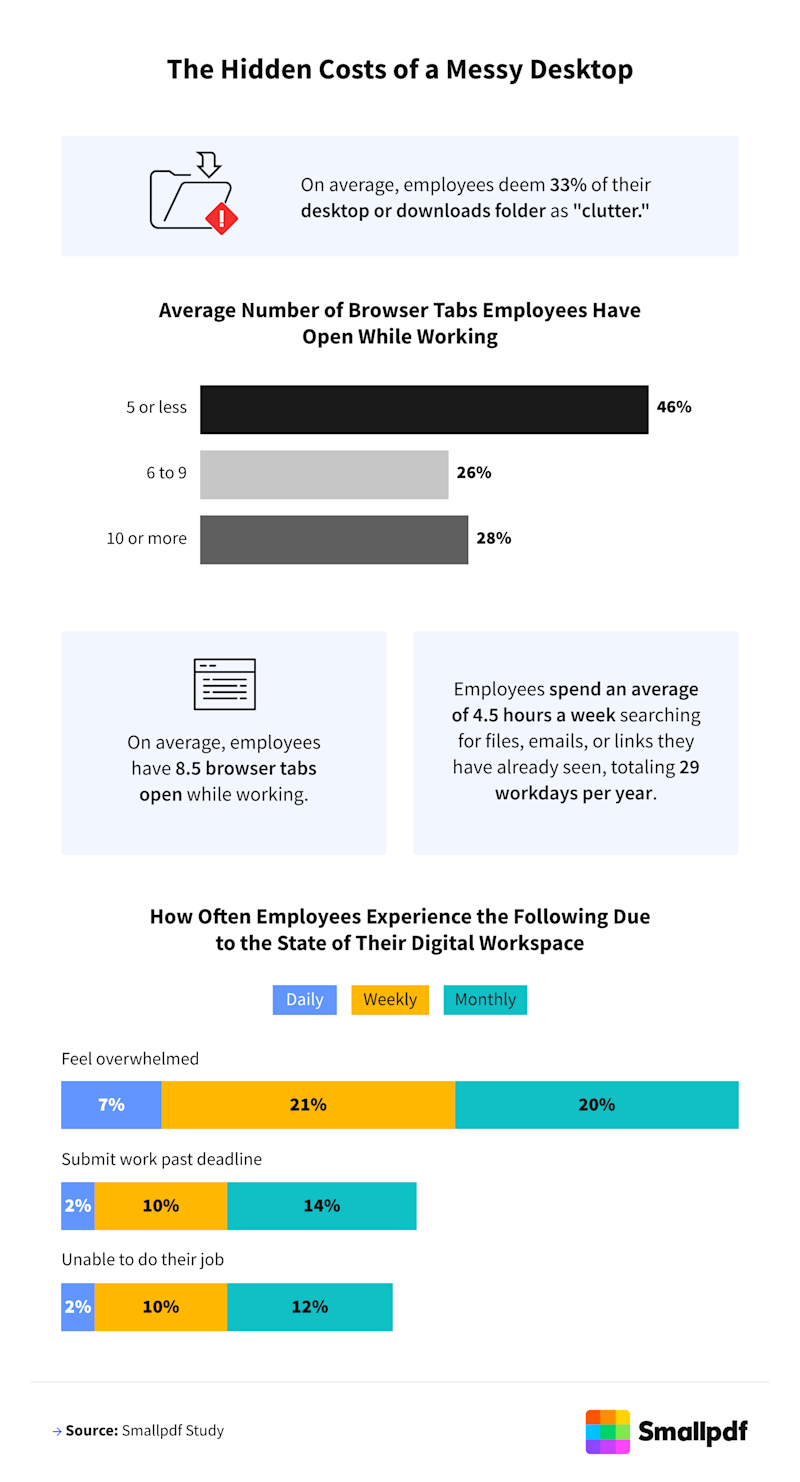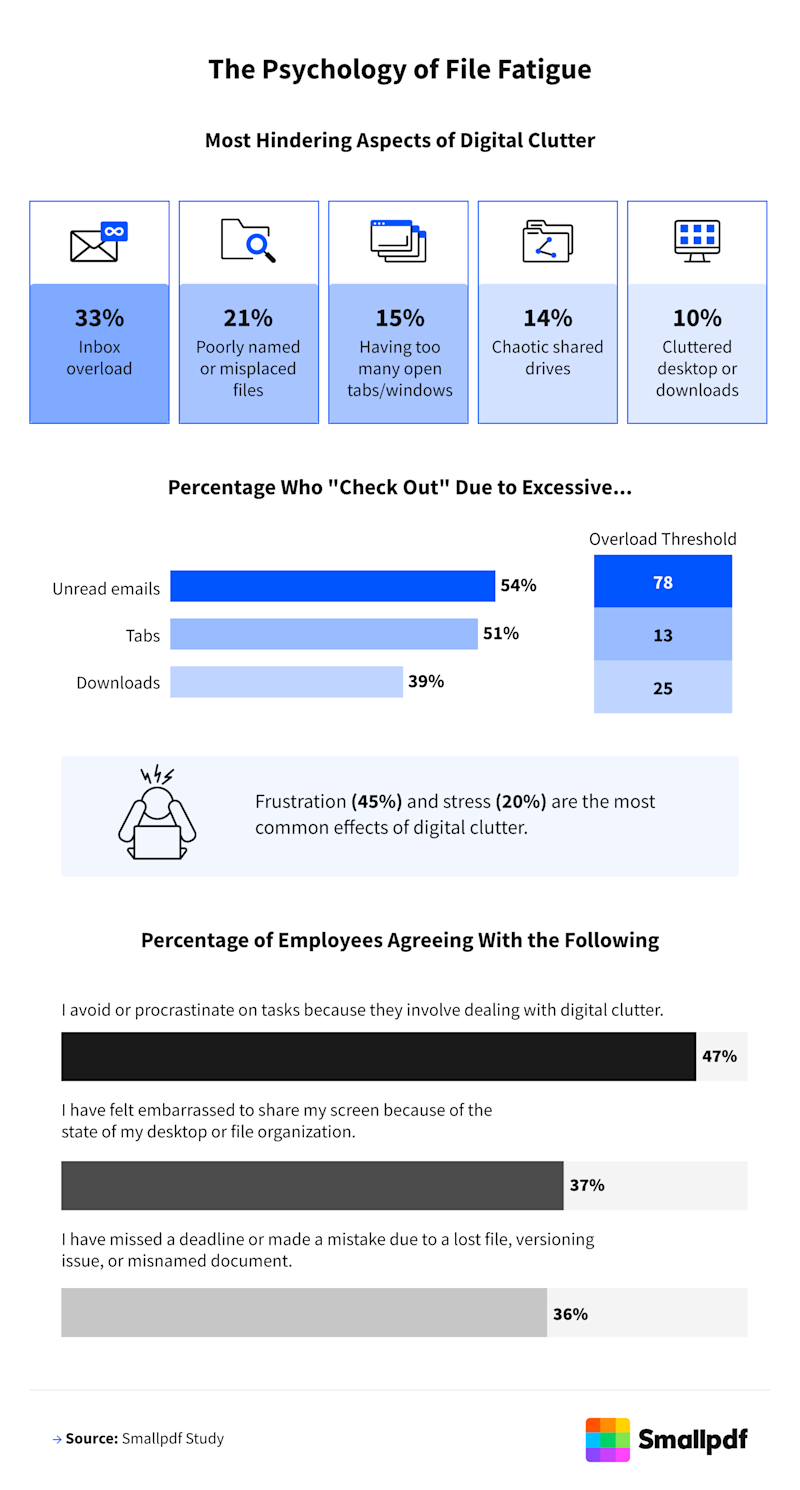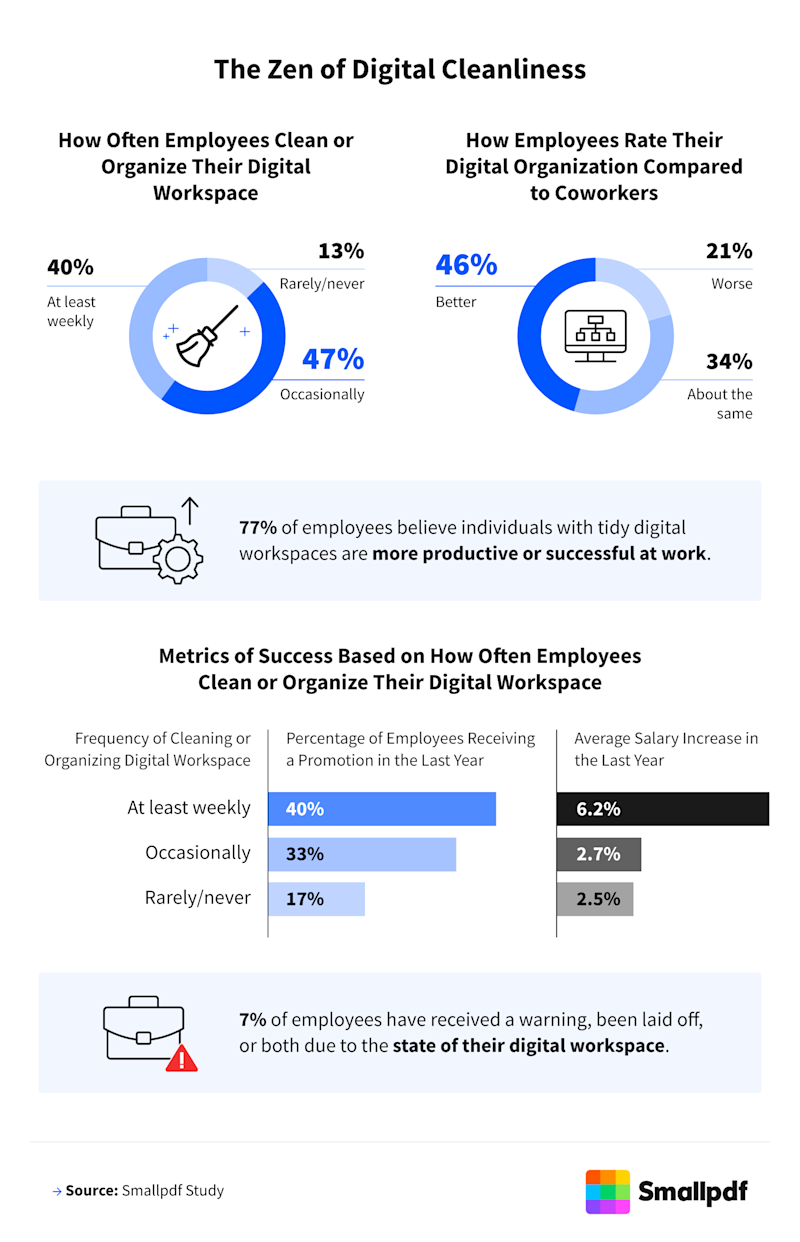
Digital file disorganization is draining focus, time, and happiness in the workplace.
In a world where almost every task begins on a screen, digital disorganization has quietly become one of the biggest drains on focus and productivity. From overflowing inboxes to endless browser tabs, digital clutter slows us down and affects how we feel at work. To understand how this problem impacts professionals, Smallpdf surveyed 1,005 U.S. employees about their digital habits and workspace organization.
As a company dedicated to making document management simple and stress-free, we wanted to learn how cluttered digital environments influence performance, motivation, and overall well-being. The study builds on our mission to help people work more efficiently by creating order in their digital workflows.
The results show that disorganization costs workers time, energy, and confidence. Taking a few moments to keep digital workspaces tidy can help professionals regain focus, save time, and feel more in control of their day.
Key Takeaways
- On average, American employees spend 4.5 hours a week searching for files, emails, or links they have already seen, totaling 29 work days per year.
- On average, employees have 8.5 browser tabs open while working; 28% usually have 10 or more tabs open.
- Over 1 in 2 employees "check out" at work due to excessive unread emails (54%) or excessive tabs (51%); the average overload thresholds are 78 and 13, respectively.
The Daily Chaos of Digital Workspaces
Even before opening their first meeting link, many workers are already battling digital clutter. The constant cycle of searching, sorting, and reopening the same documents or emails adds up to a staggering loss of time every year.

On average, employees spend 4.5 hours per week searching for files or links they've already accessed, equal to 29 workdays per year. That's more than a full month of productivity lost to digital disorganization.
Windows users reported spending 1 hour more per week than Mac users, and finance professionals topped all industries with 6.1 hours spent weekly hunting for files. Hybrid workers also struggled the most, spending 5.2 hours weekly searching through cluttered desktops and inboxes. Generationally, Gen Z workers spent the most time per week on average searching for content (5.6 hours), while millennials spent the least (4.2 hours).
On the browser front, the typical worker has 8.5 tabs open at any given time, with 28% juggling 10 or more. Remote employees lead this digital multitasking trend with an average of 10.8 open tabs, and Mac users keep over two more tabs open than Windows users.
The clutter takes a psychological toll, too. More than a quarter of employees (28%) felt overwhelmed by their digital workspace every week, with 7% feeling that way daily. Among Gen Z, that number doubled to 14%. This sense of overload is uncomfortable and has real consequences: 12% delayed submissions weekly due to digital disarray, and another 12% felt unable to perform their jobs.
Smallpdf's tools for compressing, converting, and organizing documents were built for exactly this kind of challenge. By helping users find, store, and share files more easily, Smallpdf reduces the time lost to everyday digital clutter and creates space for focus and productivity.
When Clutter Becomes a Career Barrier
Digital clutter doesn't just waste time. It also directly affects focus, motivation, and morale. For many workers, it's the silent saboteur of productivity and emotional well-being.

Inbox overload topped the list of frustrations, with 1 in 3 employees naming it the most hindering aspect of digital clutter. Gen X felt this pain most sharply (41%), while Gen Z cited poorly named or misplaced files as their top frustration (27%).
More than half of employees admitted to mentally "checking out" at work due to too many unread emails (54%) or too many tabs (51%). This disengagement often leads to negative emotions, with 45% reporting frustration and 20% citing stress as their primary reactions. For 12% of Gen Z, digital clutter went even further, triggering total shutdown or task avoidance.
Almost half of all employees (47%) said they had avoided or procrastinated on tasks specifically because those tasks involved cleaning up digital clutter. Among Gen Z, that number rose to 59%, showing that younger employees may be especially vulnerable to the mental fatigue that disorganization causes.
As a productivity partner for millions of professionals, Smallpdf understands how stress builds when digital workflows become disorganized. Our simple, fast, and secure tools for managing documents help users spend less time searching and more time doing meaningful work.
The Power of a Clean Digital Slate
Digital organization may be one of the most underrated success habits in modern work. Employees who take time to clean their digital workspace regularly see measurable benefits, from improved productivity to promotions and pay raises.

Only 2 in 5 employees reported cleaning or organizing their digital workspace weekly. Still, 77% believed that people with tidy digital environments are more productive or successful. Interestingly, 46% of employees rated their own organization better than their peers, while 21% admitted theirs was worse.
The numbers back up the benefits. Those who cleaned or organized weekly were over two times more likely than those who never or rarely did to receive a promotion in the past year. They also reported an average 6.2% salary increase, compared to 2.5% among those who never or rarely organize. Neglecting digital hygiene came with consequences for some, as 7% of employees had been warned, laid off, or both because of the state of their digital workspace.
Practical habits such as renaming files clearly, archiving old folders, or using file management tools like Smallpdf can make digital organization effortless. The easier it is to stay organized, the more likely workers are to keep it up and enjoy the benefits of a tidy digital workspace.
Order Is the New Productivity
Digital clutter quietly erodes time and chips away at confidence, focus, and professional growth. While it's tempting to ignore a crowded inbox or messy desktop, the data suggests that staying organized brings clear benefits to workers across industries, generations, and job types.
Setting aside just a few minutes each week to organize files, remove duplicates, and close unnecessary tabs can create lasting improvements in focus and efficiency. With easy-to-use tools that simplify file storage and sharing, Smallpdf helps professionals regain control of their digital space and turn order into a true productivity advantage.
Methodology
For this study, Smallpdf commissioned a survey of 1,005 employees in the United States about their digital organization and cleaning habits. Respondents represented a mix of industries, working arrangements, and age groups. Here are the specific demographic breakdowns:
Generation
- Baby boomers: 2%
- Gen X: 26%
- Millennial: 58%
- Gen Z: 14%
Work Environment
- On-site: 45%
- Hybrid: 35%
- Remote: 20%
Industry
- Technology: 19%
- Healthcare: 15%
- Education: 11%
- Manufacturing: 10%
- Finance: 10%
- Government: 8%
- Other: 27%
Findings were analyzed to uncover generational, professional, and behavioral trends around digital clutter and productivity.
About Smallpdf
Smallpdf is a leading online platform that simplifies how people manage, edit, and organize digital documents. With easy-to-use tools for compressing, converting, and organizing PDFs, SmallPDF helps professionals, students, and teams reduce digital clutter and work more efficiently. Discover how a cleaner digital workspace can save time and boost productivity with Smallpdf's tools.
Fair use statement
Information from this article may be shared for noncommercial purposes only. If you do use or cite any material, please include a link back to SmallPDF with proper attribution.
